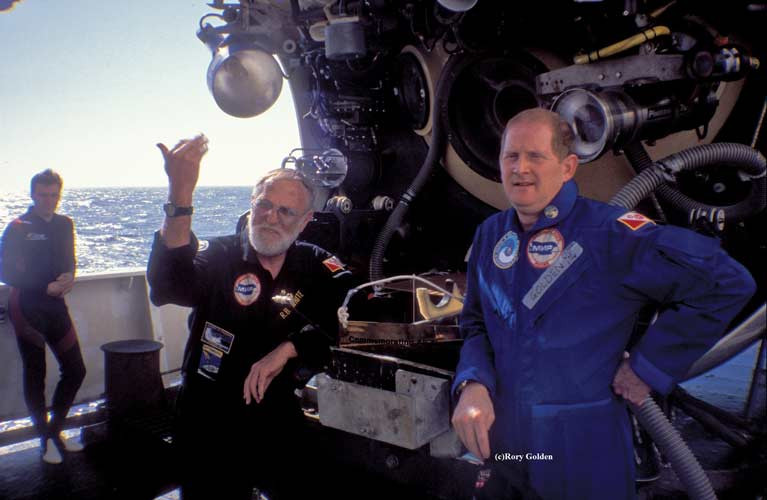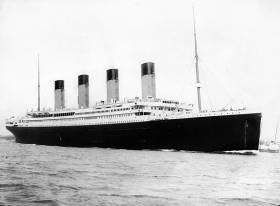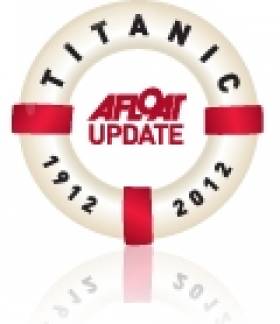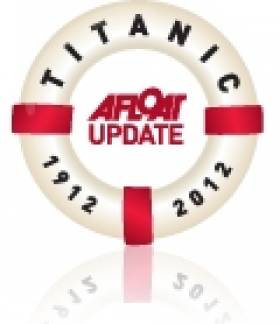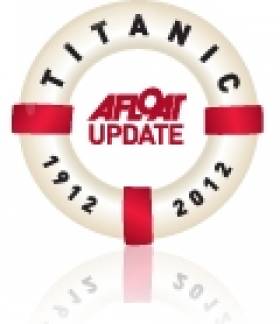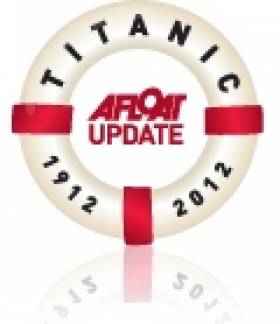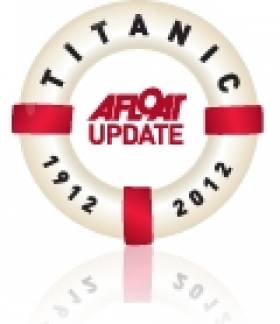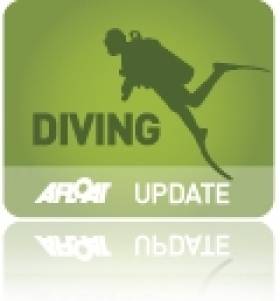Displaying items by tag: Rory Golden
Irish Diver Rory Golden Consulted on New Expedition to Recover Titanic's Wireless Marconi Telegraph
Irish deep-sea diver Rory Golden is providing expertise to a new expedition to the Titanic which aims to recover the Marconi radio from the wreck, The Sunday Times reports.
The wireless Marconi telegraph was instrumental in saving more than 705 passengers from freezing Atlantic waters when the ship sank after striking an iceberg off Newfoundland in April 1912 with the loss of almost 1500 lives.
As Afloat reported previously, the ambitious project to retrieve the most famous marine radio in the world from 2.5 miles down in the Atlantic has finally secured legal approval.
The new expedition planned by RMS Titanic Inc, the salvor-in-possession, will be led by Dr David Gallo and French former naval officer Paul Henri Nargeolet.
Dublin-based Golden, who was the first Irish diver to visit the wreck site in almost 4,000 metres of water, has been engaged as a consultant to the company which has recovered over 5,500 artefacts in eight previous expeditions.
The former managing director of Virgin Records Ireland was dive safety operations manager for the Operation Titanic 2000 project which recovered 800 items - including the main ship’s wheel which he spotted. He returned in 2005 for a second dive, which was recorded in a BBC documentary.
In March 2013 he was a member of the team sponsored by Amazon.com founder Jeff Bezos which salvaged five Apollo F-1 rocket engines from 4200 metres in the North Atlantic, including one from Apollo 11 which launched a man to the moon in 1969.
Golden’s participation is one of several Irish connections to the new diving expedition which is expected to cost at least 10 million US dollars.
A Mayo community’s support for the new venture also helped to secure recently approved US Admiralty Court permission for it.
A letter to the US Admiralty Court from Addergoole Titanic Society director Toss Gibbons, secretary Mary Rowland and public relations officer Frank Gibbons urged that it would “give its blessing” to RMS Titanic Inc to undertake the expedition. The society remembers 11 of the ship’s fatalities from the Mayo village of Laherdane and surrounding area.
“We spent a lot of time in Ireland, in Belfast and with the folks in Addergoole to put a plan together which would satisfy the court,” RMS Titanic Inc president Bretton Hunchak said.
The recovery of the Marconi telegraph is crucial to understanding “the story of all of the survivors”, Hunchak explained.
 The Marconi Telegraph room as seen from the top of the Titanic Photo: Rory Golden
The Marconi Telegraph room as seen from the top of the Titanic Photo: Rory Golden
“Ultimately, the Marconi radio system remains an unsung hero, responsible for countless generations of families that exist only because the radio cried out on behalf of their ancestors,” he said.
“ For that reason, we must recover this incredible piece of history, to rescue the radio that saved 705 lives from being taken from the world that fateful night."
 The hatch to the Marconi Room Photo: Rory Golden
The hatch to the Marconi Room Photo: Rory Golden
Hunchak said the original plan for the expedition was within a weather window between June and August of this year, and that might still take place.
“Obviously, with the Covid-19 pandemic, we have questions now and will make a decision on timing very shortly,” he said.
“The Marconi telegraph is recognisable, from our underwater photography, but if we recover it there will be considerable conservation required before we can take it around the world as part of our exhibition of artefacts,” he said.
Golden said the project was “fraught with a lot of unknown and known variables, such as the condition of the roof area, the wreck itself, currents, visibility” and other factors, but has “a very good chance of succeeding”.
The wreck of the Titanic was discovered by Dr Robert Ballard and Jean Louis Michel in a joint US/ French expedition on September 1st, 1985, some 963 miles northeast of New York and 453 miles southeast of the Newfoundland coastline.
More on the Sunday Times report here
Titanic Wreck Still Marvels 32 Years On From Its Discovery
#Titanic - This past Friday 1 September marked 32 years since the discovery of the wreck of the ill-fated Titanic.
Irish deep-sea diving expert Rory Golden was among the first to set eyes on its remains in person during an expedition in 2000 — an “awe-inspiring” moment, as he tells the Irish Examiner’s Conor Kane.
Visitors to Titanic Belfast can get a taste of what it felt like to witness the shipwreck first hand, in the Titanic Beneath portion of the Titanic Experience tour which displays documentary footage from a deep-sea expedition beneath a glass floor.
But for Golden, nothing compares to being there in the moment — or getting to touch with his own hands the ship’s wheel he helped recover from the wreck site.
The Irish Examiner has much more in the story HERE.
Rory Golden Returns to the Titanic With Stage Show
#TITANIC - The first Irishman to see the wreck of the Titanic takes to the stage in the UK next week to present his personal recollections of the experience.
As Biggleswade Today reports, deep-sea diving expert Rory Golden will give his two-part presentation Return to the Titanic at the Gordon Craig Theatre in Stevenage next Wednesday 26 September.
The show - previously hosted at the Marine Institute earlier this year - covers the history of the ill-fated cruise liner's construction at Harland & Wolff in Belfast, through its tragic demise in 1912, and its eventual rediscovery on the North Atlantic sea bed in 1985.
Fifteen years after the wreck was found on a French/American expedition, Golden descended the nearly 4km below the surface on a Russian submarine to witness the watery grave site for himself - and his show lets the audience see some of the magnificent sights he saw.
“When I first cast my eyes on the wreck," he told JOE.ie in April this year, "for me it was just an incredibly exciting and equally humbling and incredibly poignant moment and you have all these emotions all at once because you are looking at something very few people in the world have seen.”
First Irishman to Dive Titanic Site Shares His Story
#TITANIC - To mark the 100th anniversary of the sinking of the Titanic, JOE.ie sat down with the first Irishman to dive the historic wreckage.
In 2000, Rory Golden descended two-and-a-half miles beneath the surface of the Atlantic to witness the Titanic's watery gravesite.
“When I first cast my eyes on the wreck," he says, "for me it was just an incredibly exciting and equally humbling and incredibly poignant moment and you have all these emotions all at once because you are looking at something very few people in the world have seen.”
Amazingly, the self-avowed Titanic expert wasn't originally a part of the dive team for the expedition.
"My role at the time was to be the dive safety supervisor, but that whole role changed over the course of the expedition," he says. “There was no guarantee of me going down there because I was very low in the pecking order."
But a memorial plaque he brought with him from Cobh ended up being Golden's ticket to the TItanic, joining the crew aboard an 18-tonne Russian submarine.
And he came back with more than memories, too, as a glint in the corner of his eye turned out to be the remains of the ship's wheel.
"I was the first person to touch the wheel of the ship since it went down in 1912 and probably the last person to hold it before it went down was Captain Smith.”
JOE.ie has much more on the story HERE.
Maritime Institute to Host Tributes to Titanic
#TITANIC 100 – In this centenary week of the sinking of RMS Titanic a talk and musical tribute will be held in memory of the disaster this evening (8 pm) in the newly opened maritime museum in Dun Laoghaire as previously reported on Afloat.ie.
Deep-sea diver Rory Golden became the first Irishman to see the wreck of the Titanic and he will present an illustrated lecture. The musical tribute will be led by uillinn piper Eamon Galdubh – where similar music will be aired to that played in the 2nd and 3rd class compartments on the Titanic.
In addition the Maritime Institute of Ireland (M.I.I.) which runs the museum will run its final lecture for the season next week. The lecture 'Titanic -Locked in History' which will be held next Thursday (19th April) at 8pm in the Stella Maris Seafarers Club in Dublin city-centre and is to be presented by Michael O'Flaherty.
For information on both the Titanic Tribute evening (tickets cost €10) call 087 900 7466 and by also viewing the website which includes details about next week's admission free lecture visit: www.mariner.ie
Music & Talk Tribute to Titanic
#TITANIC – The Maritime Institute of Ireland is to host a musical tribute and illustrated talk to mark the centenary of the Titanic shipping disaster. The evening event (starting at 8pm) is to be held on Thursday 12th April in the Maritime Museum, Dun Laoghaire.
The musical tribute will be led by uillinn piper Eamon Galdubh – similar music to that played in the 2nd and 3rd class compartments on the Titanic. The illustrated talk will be presented by well-known deep sea diver Rory Golden, the first Irishman to see the wreck of the Titanic. He was also the first person to touch the ship's wheel since the ship's Captain did in 1912.
Tickets for the event are available at €10 each (concessions €5) from Costello Jewellers, 1 Northumberland Avenue, Dun Laoghaire. In addition tickets can be purchased from the museum which is to reopen to the public next week on Tuesday 3rd April. For more visit www.mariner.ie
Maritime Institute's Museum to Host 'Titanic Centenary' Presentation
#TITANIC-The Maritime Institute of Ireland is to hold a 'Titanic Centenary' event in their maritime museum, Dun Laoghaire on Thursday 12th April (starting at 8pm) noting doors open from 7.30pm.
The first Irish diver to see the wreck from a Russian MIR submersible, Rory Golden will provide an illustrated talk on the latest revelations through an audio-visual presentation. Golden's first Titanic experience was on an expedition in 2000, which yielded hundreds of artefacts.
To ensure a place of the ticketed event, bookings can be made from Linda from the maritime museum's shop Tel: 01 214 3964 (on the top floor of the Dun Laoghaire Shopping Centre) as the museum itself is not due to re-open until early April as previously reported on Afloat.ie.
Alternatively tickets can be booked at Costello Jewellers, 1 Northumberland Avenue, Dun Laoghaire Tel: 01 230 2311 (messages) and Barney Yourell, Lectures Officer of the institute by calling Mob: 087 900 7466. Tickets cost €10 each and concessions for senior citizens and unwaged etc are priced at €5. For further information contact Mob: 086 074 5402 and by visiting www.mariner.ie
Dive Ireland Expo Returns
#DIVING - Dive Ireland 2012, Ireland's only dedicated dive expo, promises to be bigger, better and feature more speakers, exhibits and workshops - everything for the dive professional as well as the complete beginner.
The 21st Annual International Dive Show, hosted by the Irish Underwater Council (CFT), will take place at the City North Hotel in Dublin on the weekend of 3-4 March.
This year's show will feature top SCUBA professionals including keynote speaker Rory Golden, who in 2000 became the first Irish diver to visit the wreck site of the Titanic, returning for a second visit in 2005.
Golden will be giving a series of talks on his experiences to mark the centenary of the ill-fated ship's sinking in the north Atlantic.
Dive Ireland 2012 will also feature a huge array of Irish SCUBA companies, free seminars and practical workshops that will cater to a wide range of diver interests, along with a host of in-show features guaranteeing a great day out for divers and non-divers alike.
Visit the Dive Ireland 2012 website for more details on tickets or booking a stand.



























